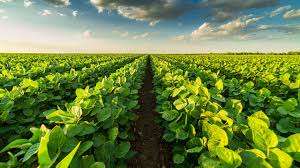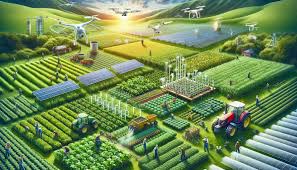Sustainable agriculture is a modern approach to farming that aims to balance environmental health, economic profitability, and social equity. It addresses the growing concerns of environmental degradation, food security, and the well-being of farming communities. As the global population increases, the demand for food production escalates, making sustainable agriculture a crucial solution for long-term agricultural productivity.
Understanding Sustainable Agriculture

Sustainable agriculture encompasses farming practices that meet the needs of the present without compromising the ability of future generations to meet their own needs. It emphasizes reducing environmental impact, conserving natural resources, and fostering economic viability for farmers. This holistic approach integrates scientific innovation, traditional knowledge, and ecological principles to create systems that are environmentally sound, economically viable, and socially equitable.
Key Principles of Sustainable Agriculture
Several principles guide sustainable agriculture practices. These principles aim to ensure that agricultural systems remain productive while preserving the environment.
- Soil Health Maintenance
Healthy soil is the foundation of sustainable. Practices such as crop rotation, cover cropping, and reduced tillage help improve soil structure, enhance nutrient availability, and increase organic matter. These methods also prevent soil erosion and promote biodiversity within the soil ecosystem. - Water Conservation
Water is a critical resource for agriculture. Sustainable practices include efficient irrigation systems, rainwater harvesting, and maintaining water quality through reduced chemical use. These measures help minimize water wastage and protect water sources from pollution. - Integrated Pest Management
Sustainable agriculture promotes pest control methods that minimize harm to the environment. Techniques like introducing natural predators, using biopesticides, and practicing crop diversification reduce reliance on chemical pesticides. - Energy Efficiency
The use of renewable energy sources and energy-efficient machinery is encouraged in sustainable farming. This reduces carbon emissions and lowers the overall ecological footprint of agricultural operations. - Biodiversity Preservation
Maintaining a diverse ecosystem is essential for sustainable agriculture. Biodiversity enhances resilience to pests and diseases, promotes pollination, and supports ecological balance.
Benefits of Sustainable Agriculture
Sustainable agriculture offers numerous advantages, not only for the environment but also for farmers, consumers, and society as a whole.
- Environmental Benefits
By minimizing the use of synthetic chemicals and adopting conservation techniques, sustainable farming reduces pollution and protects natural habitats. It also helps mitigate climate change through carbon sequestration in soils and reduced greenhouse gas emissions. - Economic Advantages
Farmers practicing sustainable agriculture often experience reduced input costs, increased yields over time, and access to premium markets that value sustainably produced goods. This economic stability contributes to the long-term viability of farming as a profession. - Social Equity
Sustainable supports fair labor practices and strengthens rural communities. It encourages the equitable distribution of resources and improves the quality of life for farmers and agricultural workers. - Food Security
Sustainable practices ensure a steady supply of nutritious food by protecting the resources required for agricultural production. This contributes to global food security in the face of challenges like climate change and population growth.
Challenges in Implementing Sustainable Agriculture

Despite its numerous benefits, sustainable agriculture faces several challenges that hinder its widespread adoption.
- High Initial Costs
Transitioning to sustainable farming methods often requires significant upfront investment in new equipment, infrastructure, and training. This can be a barrier for small-scale farmers with limited financial resources. - Lack of Awareness
Many farmers are unaware of the long-term benefits and techniques of sustainable agriculture. Outreach and education programs are essential to bridge this knowledge gap. - Policy and Market Barriers
Government policies and market structures often favor conventional agriculture, making it difficult for sustainable practices to compete. Advocating for supportive policies and creating incentives for sustainable farming are critical steps forward. - Climate Change
Unpredictable weather patterns and extreme climate events pose significant risks to agricultural systems, making it challenging to implement and maintain sustainable practices.
Innovations Driving Sustainable Agriculture
Advancements in technology and science are transforming sustainable agriculture, making it more accessible and efficient.
- Precision Agriculture
Technologies like GPS, drones, and sensors allow farmers to monitor and manage their fields with pinpoint accuracy. This reduces waste, optimizes resource use, and enhances productivity. - Agroecology
Agroecology integrates ecological principles into agricultural practices, promoting a harmonious relationship between farming and the environment. It emphasizes diversified cropping systems, agroforestry, and soil conservation. - Biotechnology
Innovations in biotechnology have led to the development of disease-resistant crops, biofertilizers, and biopesticides. These solutions reduce dependence on synthetic chemicals and enhance sustainability. - Vertical Farming
Vertical farming, where crops are grown in stacked layers using controlled environments, is a revolutionary approach to sustainable agriculture. It requires less land, water, and energy while providing high yields.
The Role of Consumers in Supporting Sustainable Agriculture

Consumers play a crucial role in promoting sustainable agriculture through their purchasing decisions and awareness.
- Choosing Sustainable Products
Buying products labeled as organic, fair trade, or sustainably sourced encourages farmers to adopt sustainable practices. This demand creates a market for environmentally friendly products. - Reducing Food Waste
Minimizing food waste reduces the overall environmental impact of food production. Consumers can contribute by planning meals, storing food properly, and composting organic waste. - Advocacy and Education
Supporting policies that promote sustainable agriculture and partaitogel educating others about its benefits can drive systemic change. Consumers can influence policymakers and businesses by voicing their preferences for sustainable practices.
Global Efforts Towards Sustainable Agriculture
Countries and organizations worldwide are recognizing the importance of sustainable agriculture and implementing measures to support it.
- Sustainable Development Goals
The United Nations’ Sustainable Development Goals emphasize sustainable agriculture as a means to achieve food security, eradicate poverty, and protect the planet. - Agricultural Research
Institutions and universities are conducting research to develop innovative solutions for sustainable farming challenges. These efforts focus on enhancing productivity while preserving natural resources. - International Collaboration
Global partnerships and initiatives aim to share knowledge, resources, and technology to promote sustainable agriculture on a broader scale.
A Sustainable Future for Agriculture
Sustainable agriculture is not just a farming practice but a necessity for the future of humanity. It ensures the availability of food, preserves the environment, and fosters social and economic well-being. By embracing sustainable practices, farmers, consumers, and policymakers can work together to create a resilient and equitable agricultural system.
The transition to sustainable agriculture requires collective effort, innovation, and determination. As the global community continues to face challenges such as climate change and resource scarcity, sustainable farming offers a viable solution to secure a greener and more prosperous future for all.









